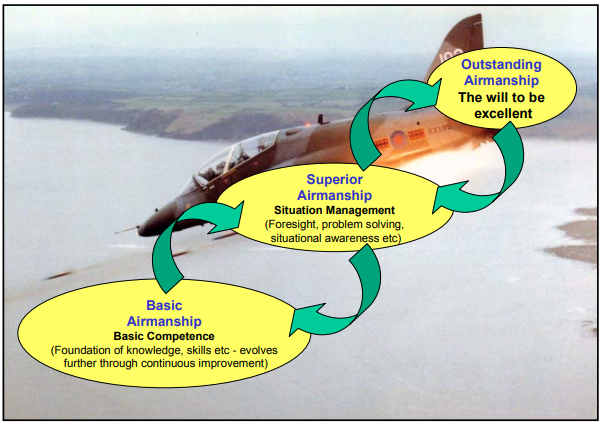Cool 
I presume alioth had this Currency Barometer local copy in mind
The BGA (British Gliding Association) have a very similar chart for gliding – I can’t find it online, though. Similar concept, but aimed at gliders, obviously :-)
I think the list is pretty good. It has been demonstrated that an “interested” attitude makes a difference to safety hence the items re taking new training, reading the POH, reading articles about safety etc. It is not so much the specific thing that is done but the fact that you spend some potentially non-aviation time studying aviation.
LeSving wrote:
An article can be found here.
Thank you for your post and the link. Excellent!
Thanks for the examplary explanation LeSving, it underlines quite nicely what this self-test is about and ways to rectify “rustiness”.
A cross country trip might be just the right next step for me once I feel comfortable in the circuit and with basic airwork again. 
Well worth reading I think.
Agree.
Emir wrote:
If I fly solely one type/model and I’m current in it, I’m definitely less rusty then a guy who jumps in one of three aircrafts he flies from time to time. For tail wheel it’s the same – I fly it regularly or I don’t fly it at all – if I don’t fly it at all, the fact I haven’t tried it won’t increase of decrease my rustiness.Participation on safety meeting and GA portal of CAA really made me laugh.
Although I regularly attend fly-ins I somehow miss to see contribution in decreasing rustiness except improving English and social skills.
I think you miss the point somewhat. Maybe if you think in terms of airmanship it makes more sense. An article can be found here. Well worth reading I think.
A personal state that enables aircrew to exercise sound judgement, display
uncompromising flight discipline and demonstrate skilful control of an
aircraft and a situation. It is maintained by continuous self-improvement and
a desire to perform optimally at all times.

Although I’m sure a few people on this board are on the “outstanding” level, I think most private GA pilots are on the basic level. IMO if you are in the green zone on the card, you also are on the basic level (or higher). But to get in the green zone, doesn’t happen by itself, and you have to continuously keep working at it to stay there. Getting hours stacked up is obviously important, but it’s only a part of it.
Let’s take MedEwok as an example, since he got only 5 points. He is rusty. What can he do? By far the easiest thing he can do (to stack up some points) is to take a Saturday and/or Sunday for a cross country trip in his A210, visiting several other fields. On that trip he could fly to short fields, soft fields etc. He will/can easily get “skill points” in:
That’s 7 points “just like that” in addition to hours flown and landings. To get more points, he needs to fly more. There is no way to get into the green zone with less than 10 h flying and less than 20 landings. Planning this trip he will (or easily could if he hasn’t already through EuroGA for instance);
That’s 13-14 “knowledge point” in one go, and he is right into the green zone. That is what one single cross country trip will do. To get more skill points to get into the green zone, he has to fly more, get those hours and landings stacked up as well. This will also eventually put him into the “basic” level of airmanship. IMO this is a reasonable assessment on all accounts, and it’s nothing new. I think deep down this is exactly how we feel about currency, skills, knowledge and so on.
Emir wrote:
Very few (I could say none) points listed in questionnaire address complacency.
I disagree. The following points from the list are as, if not more likely complacency issues as rust issues. They are all points for which the pilot may think that they remember, or really is not too concerned, and as such need review to prevent or remind one’s self about the risks of complacency. Each of the following points relate to an aspect of piloting where the pilot might conduct the flight entirely safely, but by luck, in spite of complacency.
Has evaluated own skills / personal minimum criteria, Studied the handbook of the airplane,
Studied regulations, Studied AIP, Done a detailed navigation planning, Done weight and balance calculations, and
Know your mental limits
Quote
I would add to the list: Competed a fuel burn plan for a multi tank, multi stop flight where fuel weight is a factor in the W&B, reviewed the limitations presented in flight manual supplements applicable to that/that model of aircraft, and, familiarized themselves with aircraft systems so as to understand what alternative action is best in the case of an in flight systems failure – particularly electrical.
Again, all topics where the pilot might luck out, and get it right. They were complacent, and really did not recall the most recent information, but got away with it – or not….
Pilot_DAR wrote:
Repeating procedures is a way of preventing becoming rusty, but for that to be effective, the broad range of procedures must be repeatedly practiced, not just circuits.
Did I mention circuits? I clearly wrote procedures. And I mean all procedures, ground and in-flight. What is the other way of preventing skill to become rusty except repeating the procedure regularly?
Pilot_DAR wrote:
I would expect that the purpose of the self test is to check against both of these conditions, not just rusty.
Very few (I could say none) points listed in questionnaire address complacency.